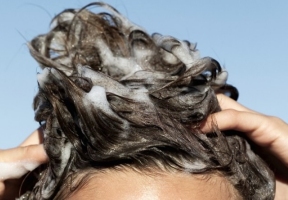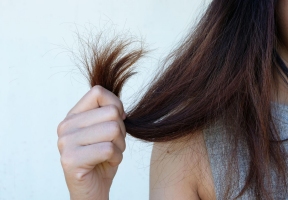

Have good hair care and hygiene habits. When washing hair, massage your scalp, rinse well with cold water, and avoid pulling back on your hair because that can put traction on the follicles. The same goes for combing. It’s less stressful on the follicles to wash and comb your hair forward, toward your face, instead of toward the back of your scalp and neck. Also, long hair weighs more, so on its own, it can put more traction on the follicles. Regularly brushing hair, however, is actually good for it— brushing massages the scalp and helps improve blood flow and circulation. Brushing your hair once a day, especially with a brush that can stimulate the scalp, is almost as good as shampooing your hair. That’s partly because brushing can help remove dirt from the scalp. It’s also important to keep your combs and hairbrushes clean. The condition of your hair should also be in balance—not too oily, not too dry. Also avoid overuse of a hair dryer on your hair— that can make it weak and brittle, which can lead to more hair loss.
Watch your nutrition. Some fad diets may have a nutritional impact on hair loss. In my opinion, it’s really important to eat a healthy balance of carbohydrates, proteins, and fat. Also take a multivitamin that includes vitamins A, B complex, C, D, and E, along with the minerals zinc, iodine, and iron. You may want to also take a supplemental B-complex vitamin, although most multivitamins have sufficient amounts of Bs. And, if not in the multivitamin, also supplement with biotin, a coenzyme that helps the function of B-complex vitamins.
Avoid unhealthy environments. Avoid radiation exposure and air pollution that may be contributing to hair loss. More specifically, avoid smoking, not only because of its negative health effects but also because it can affect hair loss. If you can identify some of the potential causes for hair loss that may not specifically be male pattern baldness, you may find successful treatment through a hair care professional, a dermatologist that specializes in scalp conditions, or a plastic surgeon or other hair transplant specialist who also treats these conditions.
Dr. Patrick Angelos (drpatrickangelos.com), author of The Science and Art of Hair Restoration: A Patient’s Guide, is a facial plastic and reconstructive surgeon whose primary surgical interests include hair restoration and facial plastic surgery.









